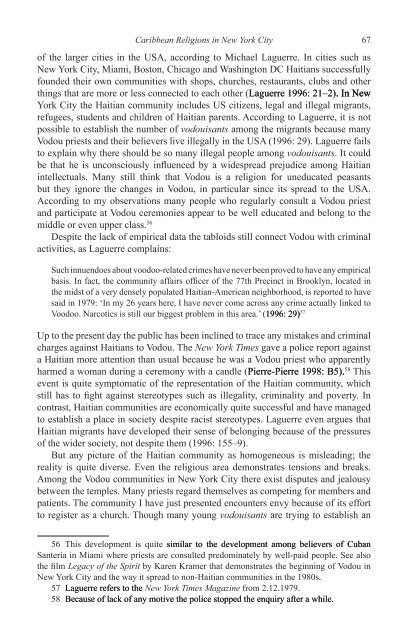You also want an ePaper? Increase the reach of your titles
YUMPU automatically turns print PDFs into web optimized ePapers that Google loves.
<strong>Caribbean</strong> <strong>Religions</strong> <strong>in</strong> <strong>New</strong> <strong>York</strong> <strong>City</strong> 67<br />
<strong>of</strong> <strong>the</strong> larger cities <strong>in</strong> <strong>the</strong> <strong>USA</strong>, accord<strong>in</strong>g to Michael Laguerre. In cities such as<br />
<strong>New</strong> <strong>York</strong> <strong>City</strong>, Miami, Boston, Chicago and Wash<strong>in</strong>gton DC Haitians successfully<br />
founded <strong>the</strong>ir own communities with shops, churches, restaurants, clubs and o<strong>the</strong>r<br />
th<strong>in</strong>gs that are more or less connected to each o<strong>the</strong>r (Laguerre 1996: 21–2). In <strong>New</strong><br />
<strong>York</strong> <strong>City</strong> <strong>the</strong> Haitian community <strong>in</strong>cludes US citizens, legal and illegal migrants,<br />
refugees, students and children <strong>of</strong> Haitian parents. Accord<strong>in</strong>g to Laguerre, it is not<br />
possible to establish <strong>the</strong> number <strong>of</strong> vodouisants among <strong>the</strong> migrants because many<br />
Vodou priests and <strong>the</strong>ir believers live illegally <strong>in</strong> <strong>the</strong> <strong>USA</strong> (1996: 29). Laguerre fails<br />
to expla<strong>in</strong> why <strong>the</strong>re should be so many illegal people among vodouisants. It could<br />
be that he is unconsciously <strong>in</strong>fluenced by a widespread prejudice among Haitian<br />
<strong>in</strong>tellectuals. Many still th<strong>in</strong>k that Vodou is a religion for uneducated peasants<br />
but <strong>the</strong>y ignore <strong>the</strong> changes <strong>in</strong> Vodou, <strong>in</strong> particular s<strong>in</strong>ce its spread to <strong>the</strong> <strong>USA</strong>.<br />
Accord<strong>in</strong>g to my observations many people who regularly consult a Vodou priest<br />
and participate at Vodou ceremonies appear to be well educated and belong to <strong>the</strong><br />
middle or even upper class. 56<br />
Despite <strong>the</strong> lack <strong>of</strong> empirical data <strong>the</strong> tabloids still connect Vodou with crim<strong>in</strong>al<br />
activities, as Laguerre compla<strong>in</strong>s:<br />
Such <strong>in</strong>nuendoes about voodoo-related crimes have never been proved to have any empirical<br />
basis. In fact, <strong>the</strong> community affairs <strong>of</strong>ficer <strong>of</strong> <strong>the</strong> 77th Prec<strong>in</strong>ct <strong>in</strong> Brooklyn, located <strong>in</strong><br />
<strong>the</strong> midst <strong>of</strong> a very densely populated Haitian-American neighborhood, is reported to have<br />
said <strong>in</strong> 1979: ‘In my 26 years here, I have never come across any crime actually l<strong>in</strong>ked to<br />
Voodoo. Narcotics is still our biggest problem <strong>in</strong> this area.’ (1996: 29) 57<br />
Up to <strong>the</strong> present day <strong>the</strong> public has been <strong>in</strong>cl<strong>in</strong>ed to trace any mistakes and crim<strong>in</strong>al<br />
charges aga<strong>in</strong>st Haitians to Vodou. The <strong>New</strong> <strong>York</strong> Times gave a police report aga<strong>in</strong>st<br />
a Haitian more attention than usual because he was a Vodou priest who apparently<br />
harmed a woman dur<strong>in</strong>g a ceremony with a candle (Pierre-Pierre 1998: B5). 58 This<br />
event is quite symptomatic <strong>of</strong> <strong>the</strong> representation <strong>of</strong> <strong>the</strong> Haitian community, which<br />
still has to fight aga<strong>in</strong>st stereotypes such as illegality, crim<strong>in</strong>ality and poverty. In<br />
contrast, Haitian communities are economically quite successful and have managed<br />
to establish a place <strong>in</strong> society despite racist stereotypes. Laguerre even argues that<br />
Haitian migrants have developed <strong>the</strong>ir sense <strong>of</strong> belong<strong>in</strong>g because <strong>of</strong> <strong>the</strong> pressures<br />
<strong>of</strong> <strong>the</strong> wider society, not despite <strong>the</strong>m (1996: 155–9).<br />
But any picture <strong>of</strong> <strong>the</strong> Haitian community as homogeneous is mislead<strong>in</strong>g; <strong>the</strong><br />
reality is quite diverse. Even <strong>the</strong> religious area demonstrates tensions and breaks.<br />
Among <strong>the</strong> Vodou communities <strong>in</strong> <strong>New</strong> <strong>York</strong> <strong>City</strong> <strong>the</strong>re exist disputes and jealousy<br />
between <strong>the</strong> temples. Many priests regard <strong>the</strong>mselves as compet<strong>in</strong>g for members and<br />
patients. The community I have just presented encounters envy because <strong>of</strong> its effort<br />
to register as a church. Though many young vodouisants are try<strong>in</strong>g to establish an<br />
56 This development is quite similar to <strong>the</strong> development among believers <strong>of</strong> Cuban<br />
Santería <strong>in</strong> Miami where priests are consulted predom<strong>in</strong>ately by well-paid people. See also<br />
<strong>the</strong> film Legacy <strong>of</strong> <strong>the</strong> Spirit by Karen Kramer that demonstrates <strong>the</strong> beg<strong>in</strong>n<strong>in</strong>g <strong>of</strong> Vodou <strong>in</strong><br />
<strong>New</strong> <strong>York</strong> <strong>City</strong> and <strong>the</strong> way it spread to non-Haitian communities <strong>in</strong> <strong>the</strong> 1980s.<br />
57 Laguerre refers to <strong>the</strong> <strong>New</strong> <strong>York</strong> Times Magaz<strong>in</strong>e from 2.12.1979.<br />
58 Because <strong>of</strong> lack <strong>of</strong> any motive <strong>the</strong> police stopped <strong>the</strong> enquiry after a while.


















